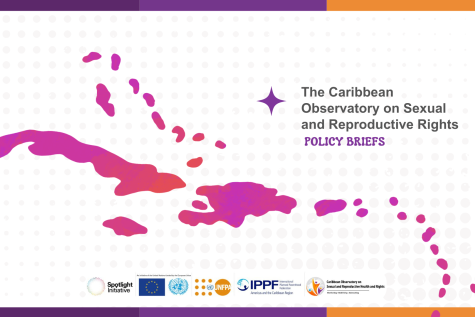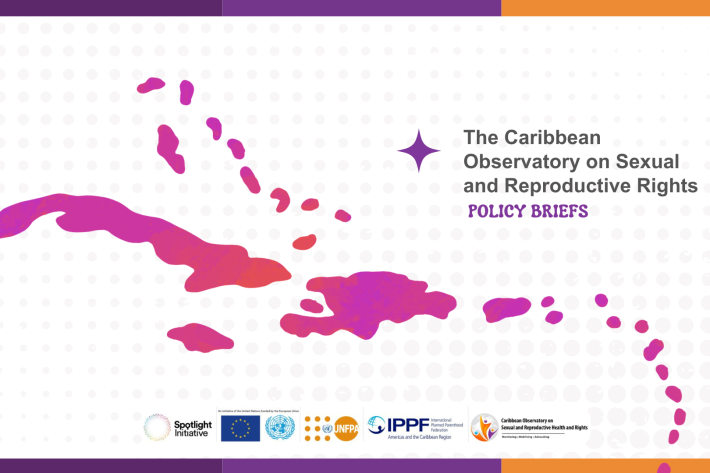Spotlight
A selection of resources from across the Federation

Americas & the Caribbean
Caribbean Observatory on SRHR: Policy Briefs
Data and Advocacy critical to shaping SRHR in the Caribbean
Filter our resources by:


| 15 December 2022
IPPF Strategy 2023 - 2028
For 70 years IPPF has championed and delivered quality services, comprehensive information and advocated for just laws so that more people in more places under more circumstances may realize their sexual and reproductive health and rights (SRHR). Started with an act of international solidarity between activists from just a handful of countries, IPPF has since grown into a broad and diverse community of services providers and advocates that stretches around the Earth. Our very existence manifests just how the demand for dignity in sexual and reproductive health and rights is universal to people the world over. But that world is changing rapidly. Tough challenges must be confronted – the toxic legacies of longstanding racism, sexism and homophobia, for example; the deepening impacts of the climate crisis, violence, and inequalities; the escalating consequences of new technologies, population displacements, and habitat destruction. Wherever such dynamics impact people’s lives, IPPF knows enjoyment of SRHR is impacted too. Whenever people confront humanitarian crises, we know their SRHR are thrust into crisis too. Whoever is subject to prejudice, bigotry, or exclusion, has their access to SRHR also eroded. We know that the worst consequences of those injustices are borne by young people in the poorest of communities, in the toughest of places, facing the fewest opportunities. To be impactful in a world of change, IPPF must change too. That is what Strategy 2028 is all about: changing IPPF so it is well equipped to uphold SRHR for those who are left out, locked out or left behind. Our Strategy 2028 sets out a familiar path but in a new direction over far tougher terrain to that clear destination. We will walk that path shoulder to shoulder with young people, and with individuals and communities bearing the full brunt of stigma and prejudice. At each step, we will defend, protect, and celebrate safety, pleasure and wellbeing in sex and reproduction. At every turn, we will denounce powers and authorities who, through policy, practice, and law, undermine dignity and human rights in those intimate realms. And, as IPPF, we will be accountable for who we are, what we do and how we do it. That is our Strategy 2028. It is with immense pride that the IPPF Board of Trustees shares this strategic itinerary with you. We very much hope you will travel this road with us – in your own realities, communities, and contexts. Let’s do that together. Let’s come together, for sexual and reproductive dignity for all - for each and every one of us, to the exclusion of none of us, in the interests of all of us. Kate Gilmore, Chair, BoT, IPPF

| 13 October 2022
IMAP Statement on Monkeypox
Monkeypox was declared a Public Health Emergency of International Concern on 23 July 2022 by the World Health Organisation. This is the first time monkeypox cases have been reported concurrently in non-endemic and endemic countries in different geographical areas. The number of cases and countries where the infection has spread has continued to increase, reaching more than 95 countries. This statement addresses that access to vaccination, care and treatment, and related research must be equitable and inclusive for all groups of people, including those already most marginalized. Download in English, French and Spanish from the menu above.
| 08 August 2022
Technical Brief: Fulfilling the sexual and reproductive rights of women living with HIV, preventing coerced and forced sterilization
The purpose of this technical brief is to promote gender-transformative, rights-based and scientifically accurate information for advocacy and service-delivery to fulfil the sexual and reproductive rights of women, girls and people who have the capacity to become pregnant, who are living with HIV. In doing so, we also aim to provide sufficient evidence to prevent sexual and reproductive rights violations, especially coerced and/or forced sterilization against those living with HIV. The technical brief documents that coerced and/or forced sterilization of women living with HIV is a persistent and serious human rights violation requiring urgent action. The brief reviews components of comprehensive sexual and reproductive health (SRH) service delivery and international medical guidance to uphold and fulfil the sexual and reproductive health and rights of women living with HIV to choose if and when to have children. This brief is primarily intended to inform IPPF Member Associations, secretariat staff, and partners including other SRH service delivery organizations and stakeholders. The brief reinforces IPPF’s position and commitment to person-centred and rights-based HIV care that is integrated within a comprehensive package of SRH services. Download the technical brief below in English or Spanish.

| 08 June 2022
2021 Annual Performance Report
IPPF has always done the utmost to advance sexual and reproductive health and rights for all. In 2021, IPPF Member Associations (MAs) continued to demonstrate their resilience and adaptability to carry on serving people in spite of the severe disruption caused by the COVID-19 pandemic. A total of 231.4 million services were delivered, a six per cent increase on 2020. Despite comprising fewer MAs, IPPF recovered more than half the decrease caused the previous year by clinic closures and other restrictions. Couple years of protection (CYP) increased by eight percent to reach 29 million – higher than in any year prior to the pandemic.

| 15 March 2022
KEY TAKEAWAYS
In September 2021, members of the Child, Early & Forced Marriage and Unions (CEFMU) and Sexuality Working Group published a letter to the editor in the Journal of Adolescent Health. The letter calls for: 1) an approach to defining and measuring success in CEFMU interventions that goes beyond age of marriage as a standalone indicator. 2) greater support for gender-transformative interventions that foster girls’ agency and shift norms related to gender and sexuality. 3) increased investment in research and evaluation to better capture sustainable change in these areas. On February 2, 2022, the Working Group convened a webinar to discuss these issues. Panelists included members of the Working Group, as well a funder, researchers, advocates and program implementers from around the world who work with and for adolescent girls. They shared their perspectives on 1) why age of marriage as standalone vision and measure of success is limiting and potentially harmful. 2) what alternative programming approaches and measurements can better lead to and capture progress in transforming the root causes of CEFMU. 3) what the field needs—from funders and from researchers—to advance work for adolescent girls that leads to their greater freedom and life opportunities.












